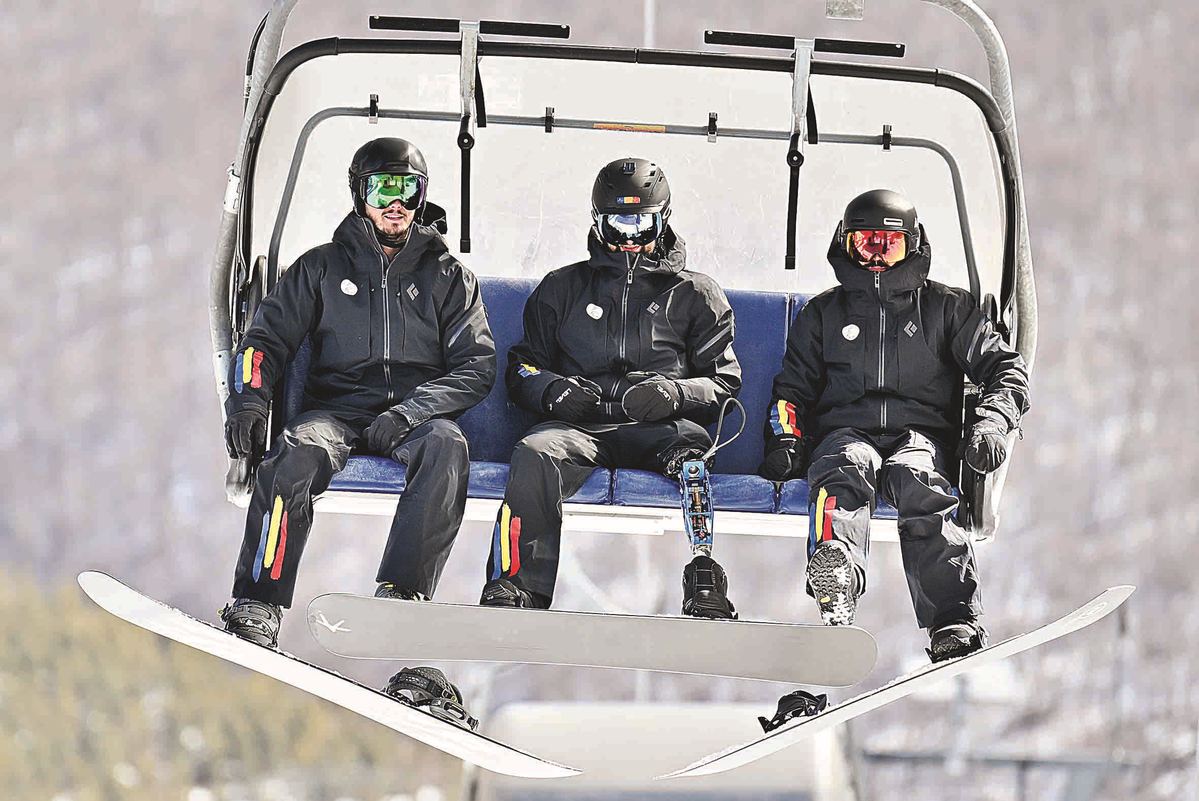Olympics boost prospects for sports industry


Breakthroughs made
In recent years, with the help of government stimulus policies aimed at developing winter sports manufacturing-along with collaboration between companies and universities-breakthroughs have been made by snowmaking facilities, skiing gear manufacturers and resorts. Such progress has helped domestic brands.
According to the China Ski Industry White Paper, which was written and compiled by Wu, from 2014 to 2020, the number of ski resorts rose sharply, with 715 venues in operation in 2020.
Over 25 ski tourism venues were visited more than 150,000 person times in 2020, compared to only 16 in 2019. However, according to the report, aerial ropeways are only installed at just over 22 percent of the ski resorts in China, showing that the majority of facilities at domestic ski venues are still not advanced.
The number of snow grooming machines-which flatten snow for smooth skiing-is still far lower than the figure for domestic resorts, highlighting the strong potential to improve the level of services. However, the number of conveyor carpets, which are used by skiing novices, rose from 454 in 2014 to 1,466 in 2020.
Hu Wei, CEO of Nanshan Ski Resort, an established skiing venue in Beijing, said it is equipped with one aerial ropeway, a T-bar lift, two snowmaking machines and one grooming machine. All this equipment is imported.
In China, although domestic manufacturers produce winter sports clothing, equipment and machines, ski resorts of all sizes tend to prefer international brands for quality and safety to ensure that they run smoothly during the relatively short snow season.
Hu said domestic companies still find it difficult to operate and develop snow grooming machines for half-pipe slopes, adding that Nanshan Ski Resort hires international professionals to supervise maintenance of these machines.
The resort has received more than 500,000 visitors this year. Its visitor numbers and revenue both rose by 30 percent year-on-year during the winter season, which in Beijing runs from November to March.
Meanwhile, the Doppelmayr/Garaventa Group, a global leader in ropeway engineering headquartered in Austria, also benefited from the Winter Olympics in Beijing.
Li Yanqiu, head of the company's China subsidiary, said the prospects for the domestic winter sports gear industry are closely linked to the number of participants.
"The winter sports market has been in hot demand lately thanks to the Games and government support policies. We hope to keep this strong momentum going for the next five years," Li said.
"The industry will only become more developed with active and in-depth public participation in winter sports."
The Doppelmayr/Garaventa Group, which generated sales revenue of 763 million euros ($835 million) in the 2020-21 financial year, has provided more than 15,100 ropeways for customers in 96 markets.
Entering the Chinese market in 1995, it has installed some 140 ropeways in the country, including part of the infrastructure for the Beijing Winter Olympics, which were held from Feb 4 to 20.
The company provided a total of 14 ropeways for Games venues in Yanqing district, Beijing, and in Zhangjiakou, Hebei province-nine for the Alpine Center in Yanqing and five for the Genting Resort Secret Garden in Zhangjiakou.
These ropeways were an important means of transportation for the Olympics, carrying athletes and their support teams to the slopes.
Li said growth of the skiing industry depends on beginners being trained from primary school level, adding that high costs and inconvenience in traveling to resorts have prevented winter sports becoming a mainstream activity.
"Skiing is still considered an expensive sports and tourism option for many Chinese people," Li said.
Many domestic ski resorts, mostly built from scratch and located far from top-tier cities, require investment of more than 1 billion yuan, resulting in additional costs for skiers and other visitors, he added.
Ding Shizhong, CEO and board chairman of Anta Sports, which is listed in Hong Kong, pointed to the uncertainties in keeping the winter sports industry healthy and on a sustainable development path after the Games.
He called for more efforts from the government to implement effective plans to support ice and snow activities, particularly at schools, communities and sports venues.
Ding said it is equally important to emphasize the integration of global winter sports resources with the Chinese market and the transfer of international technological know-how.
He suggested enhancing exchanges with leading snow and ice research and development centers worldwide, formulating plans for key technology research and upgrades to boost manufacturing capacity, and encouraging and supporting collaboration between winter sports gear manufacturers and venue operators.
Ding said establishing industrywide collaboration for the winter sports gear sector and lowering costs for small- and medium-sized enterprises by providing more financial support and improved services would help establish domestic brands.
Insiders said that for most small and medium-sized domestic enterprises in the winter sports industry, overcoming technological hurdles is tough and requires massive investment for long-term returns.
Wen Xiaoxuan, director of the new product center at Xuangong Mechanic Co in Hebei province, said a snow grooming machine was developed at the center last year after four years of research, but large-scale production is challenging, as it is limited by funding and market demands.
The company has developed seven ski grooming machines for medium-sized and large resorts.
However, despite costing 30 percent to 50 percent less than machines produced by its international competitors, and the company offering additional maintenance work, it is hard to sell to ski resorts demanding top-quality machines to guarantee that operations continue in extreme weather conditions, Wen said.
"The skiing season in China only lasts three to four months, so a resort needs something it can rely on to reduce the chance of malfunctions," Wen added.
Wen added that the company wants to attract more investors to diversify its product lines and to manufacture more snow grooming machines, including electronic ones.























